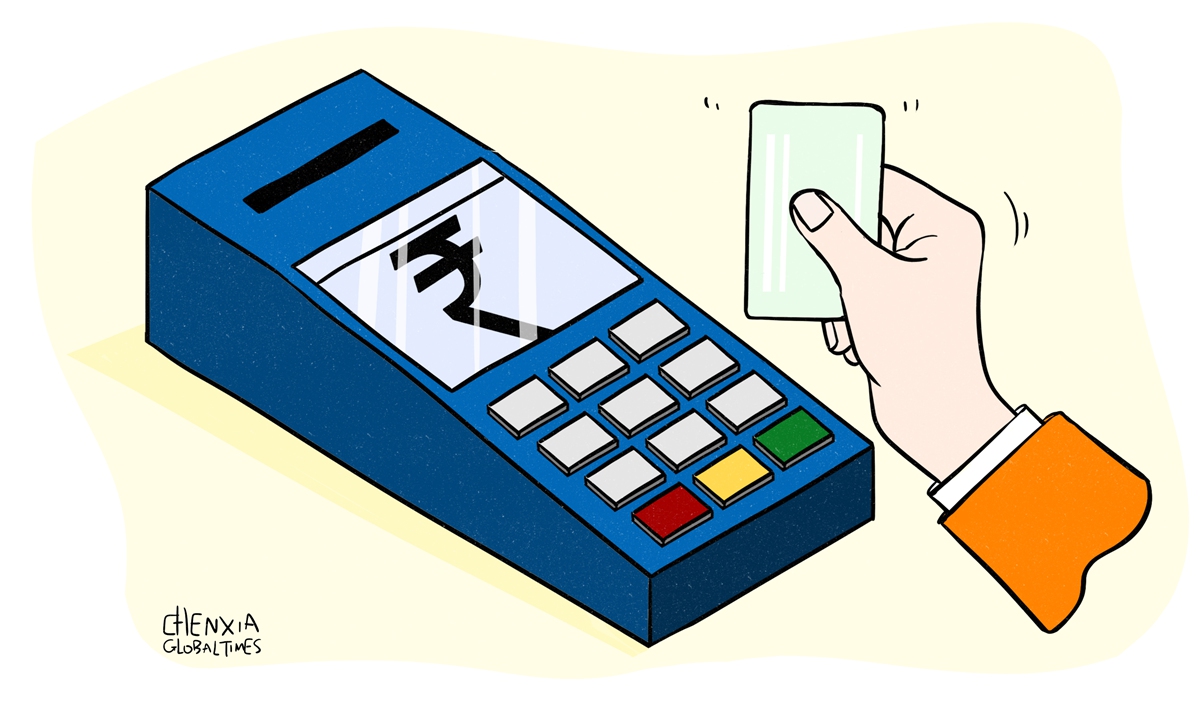
Illustration: Chen Xia/Global Times
The Reserve Bank of India (RBI), the country's central bank, on Monday announced an arrangement to allow trade settlements between India and other countries in rupees, the Indian media Business Standard reported on Tuesday.The move is aimed at promoting the growth of global trade with emphasis on exports from India and supporting the increasing interests of the global trading community in Indian rupee, according to a notification released by the RBI.
While it didn't mention any country, observers generally believe the arrangement is to facilitate trade with Russia and countries that are facing Western sanctions in terms of the traditional international trade settlement.
Still it has to be said that the timing is somehow perfect for India to introduce rupee-based trade settlement, which coincides with emerging markets' call for de-dollarization. At present, the West's restrictions and disruptions to the global supply chains through the abuse of the dollar hegemony are pressuring the world economy to reconsider the role of the dollar in the international trade system and seek for new alternatives to restore trade exchanges as usual.
India's introduction of rupee payment could mark a further step in the direction of de-dollarization. Since India is not the only Asian economy that is facing trouble or has concern over potential trouble in settling trade with other countries, its solution this time may even help boost the rupee's status in regional trade network.
It should be noted that while the use of rupee in foreign trade may help reduce the pressure on foreign exchange reserves, with the rupee approaching a fresh historical low of 80 against the US dollar on Tuesday, the weakening currency may bring uncertainty when it comes to actual operation of the rupee payment. If the rupee's stability against other major currencies cannot be guaranteed, then countries that accept rupee settlement will be exposed to greater exchange rate risk, which means they may suffer huge losses if the rupee's value plunges.
In this sense, India's rupee settlement system still has a lot of work to do if it wants to win more recognition amid the global trade system, such as maintain the rupee's general stability and strengthen settlement pilots with neighboring economies.
On the other hand, India's introduction of rupee settlement also means the competition among the global settlement currencies will get increasingly fierce in the future. With the international food and energy crises deepening, more and more countries have to use the ruble to buy food, energy or fertilizer from Russia. Moreover, given the yuan's stable performance, countries such as Saudi Arabia are reportedly considering accepting the yuan to settle its oil sale with China. Global miners have also reportedly embraced the yuan-denominated sale of iron ore to China.
With more currencies likely to join the trade settlement circle, whether within the BRICS or the G20 framework, it is time to consider how to establish a new mechanism for the countries that have the need for alternative trade settlement system to strengthen cooperation and coordination.
The author is an editor with the Global Times. bizopinion@globaltimes.com.cn

